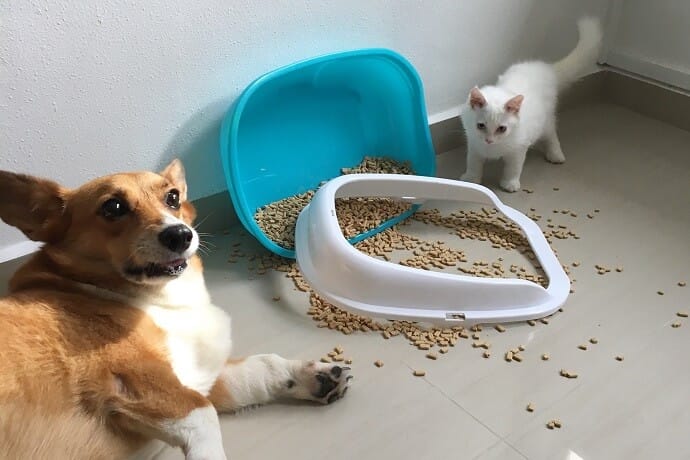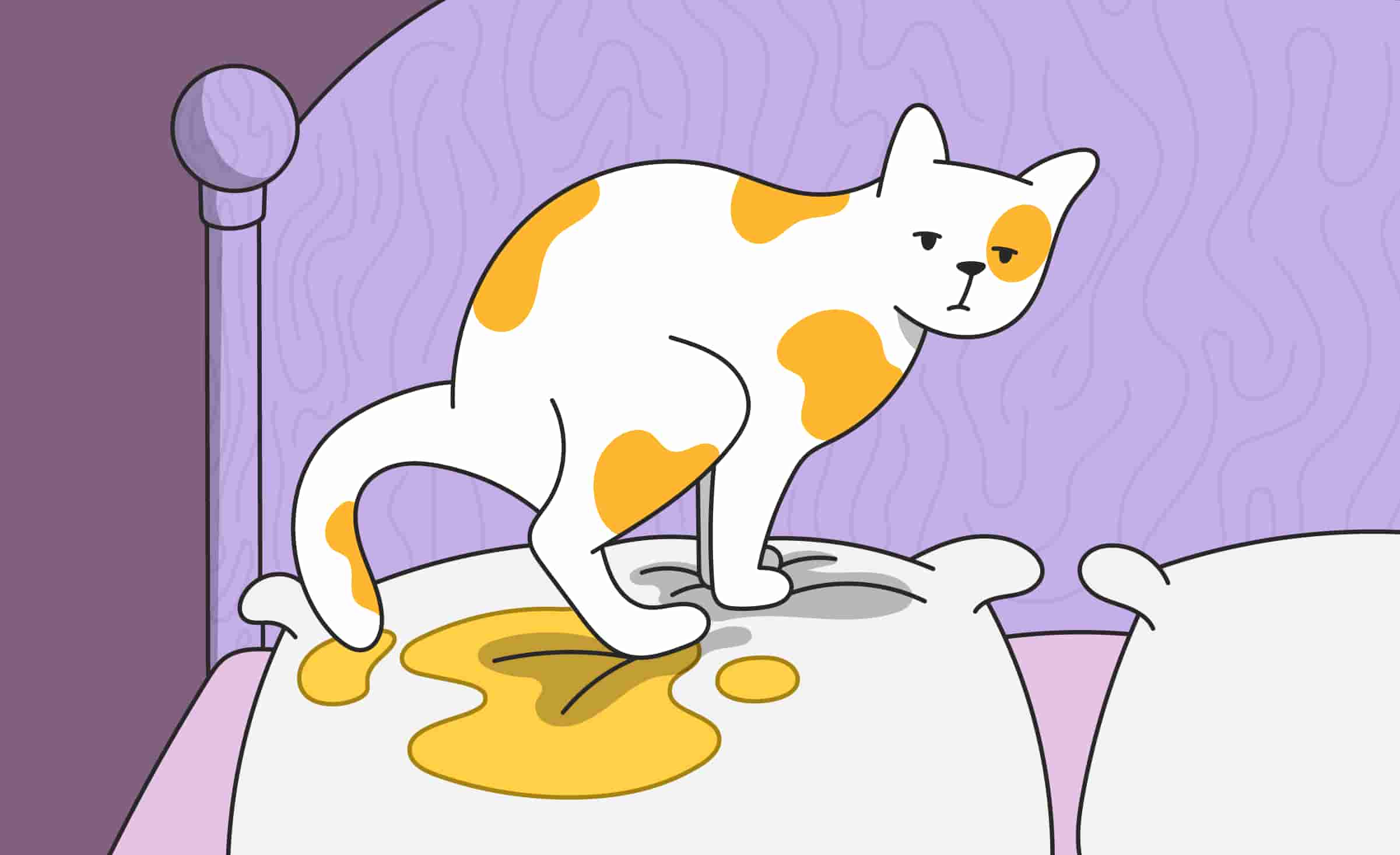Cats are famously low-maintenance when it comes to their toilet habits. They get potty trained easily and usually don’t require human intervention in their affairs until they need their litter box cleaned. Even cats that do their business outdoors feel the need to cover up any evidence.
You could go so far as to say that when it comes to toilet habits, cats are quite private. So it’s always a shock when your sweet, angelic kitty does something so out of character as to pee. On your bed, of all places.
While it’s easy to perceive such behavior as an act of rebellion, revenge, or pure malice, a cat peeing on your bed could have its root cause in a variety of factors.
Stop Googling - Ask a Real Vet
5 reasons why your cat is peeing on your bed
Cats can often be perceived as emotionally detached and aloof, but they are in fact, highly sensitive. And when they want to tell us something, they often communicate with us in ways we might not always recognize.
If your cat is peeing on your bed, Fluffy is probably trying to tell you something. No idea what that could be? Here are some possibilities:
It’s medical
“Why is my cat peeing on my bed all of a sudden? She’s potty trained.”
If your cat is fully potty trained and suddenly starts to pee on your bed, it could be that there’s a medical problem to blame.
Issues such as bladder infections, bladder stones, and urinary tract infections can cause your cat to pee outside of the litter box. These types of issues cause your cat’s bladder to inflame, giving your cat the urge to urinate more frequently and causing your cat the inability to get their litter box in time.
Other serious conditions like diabetes can also cause your cat to urinate more freely.
Signs to watch for include your cat straining to pass urine, seeming in pain when urinating, or assuming the position to pee and then producing nothing. Other context cues that your baby isn’t well would be things like a loss of appetite, a change in mood, and low energy.
Always consult your veterinarian if you suspect your cat may be unwell. Some of these seemingly odd behaviors can be signs of serious conditions that should be treated sooner rather than later. If your cat uncharacteristically urinates outside of its usual spot or litter box, head for the vet as soon as possible.
If you know that your cat has a predisposition to certain diseases or chronic illnesses, it's always better to be prepared. How? For example, to subscribe to animal insurance.
Pet Emergency Fund is an alternative pet insurance that will allow you to get peace of mind for all your pets for less than $1 per day. This insurance will give you access to a 24/7 consultation with a certified veterinarian and cover the cost of your pet's treatment in case of an emergency.
By the way, we have a theory that owners who have insurance for their pets are less afraid to leave them at home alone. Do you want to be one of them?
A great way to monitor your cat is by having a pet camera such as the Petcube Cam 360. With its 1080p HD video, 360° panoramic view, and 8× zoom features, you’ll be able to clearly observe your cat’s behavior and symptoms. Apart from this, you also get access to their online vet service, allowing you to get professional advice anytime and anywhere.
Litter box location
“Why does my cat pee on my bed when she has a litter box?”
As we’ve mentioned, cats are very private creatures. Of course, they would like to do their “business” in a peaceful and cozy location where nobody can disturb them. Just like humans, cats don't want an audience while they go to the toilet. So the litter box should always be where they can relax and feel comfortable at this crucial moment.
Noisy areas (like next to the dryer/TV) or easily accessible areas for children are bad choices. Better find a well-lit area for a litter box in a quiet corner of the house where they will have some privacy. Also, this location must have enough space that the kitty feels confident they can make a quick getaway. This is your kitty’s plan B in case of an emergency or an invasion of their privacy.
This is normal that your cat doesn’t want to feel too public, trapped, or vulnerable at this particular moment. Your goal is to create the best conditions for your pet. Then you will avoid problems with defecating the cat and situations where your bed has become a toilet for them. So find the best location for the litter box according to the conditions above, and give your cat some time to get used to the new place.

Shortage of litter boxes
“My cat keeps peeing on beds – why is that?”
One litter box for one cat may not work for all households. Some cats even prefer to poop in one box and pee in another. If you have more than one cat, you most certainly need more than one litter box.
Cats are territorial and the scent from another (perhaps more dominant) cat can ward your cat off a shared litter box. Preferably, each cat should have its own dedicated box. The general rule of thumb here is a litter box for each cat, plus one additional box as a backup.
And if your home is on more than one level, provide a litter box on each floor so your cat doesn’t have to go far should the urge to go suddenly strike.
Even having enough litter boxes won’t help if you don’t keep these clean. Cats are meticulous with their hygiene, and so will flat out refuse to use a litter box they deem too dirty. Your cat will not set paws in a litter box that will leave their paws wet with urine, or worse, which dramatically increases the chances that your cat may choose to go potty elsewhere.
Litter box mechanics
“My cat refuses to use her litter box and then keeps peeing on my bed.”
Litter boxes come in a variety of shapes and sizes and litter comes in a range of textures and materials, so you may need to reassess your current setup.
A litter box that feels constricting will deter your cat from using it. Make sure that you upgrade your litter box with the growth of your cat should you need to, particularly in the case of enclosed litter boxes.
The soft underside of a cat’s paws is very sensitive to textures, so relook your chosen litter too. Very sandy litter can irritate the more fastidious cats by sticking to their neatly groomed paws, while those with delicate paw pads might not enjoy the sensation of sharper litter crystals.
It’s sometimes a process of trial and error until your find the litter that your cat (and her adorable little toe beans) prefers.
Anxiety
“My cat peed on my bed right in front of me – why would she does that?”
Cat’s are creatures of habit and are very territorial. Major changes in their lives can cause them to feel vulnerable and experience anxiety.
The introduction of a new pet, a new baby, or moving house can cause your cat much stress and result in them acting in unusual and unpredictable ways. From over-grooming to loss of appetite, stress in cats can manifest in different ways.
In particular, a cat that feels unsafe or vulnerable in any way can take to peeing on your bed.
Similarly, a bored or under-stimulated cat can also start peeing in inappropriate areas as a way to communicate their need for more stimulation with you.
Getting to the source of why your cat peed on your bed, will help you to manage the situation effectively. It is crucial to eliminate any medical issues with a visit to the vet.
-
Don’t scold or raise your voice when your cat pees outside of their box. Your cat is not being naughty or vindictive by peeing on your bed. They’re communicating their needs to you the best way they can.
-
Shouting and becoming angry with your cat won’t make the situation any better. It can do more damage than good, by causing your cat more anxiety.
-
Start by addressing any potential issues with the litter box. Assess its placement, relook the actual litter and upgrade to more or bigger boxes should it be necessary. The idea is to create a litter box situation that your cat is comfortable with and won’t avoid.
-
If your cat peed on your bed (or anywhere outside of their litter box), make sure to thoroughly clean the area. Cats are scent-driven creatures and will associate the smell of their urine with the toilet and continue to return to the same spot to relieve themselves. You don’t want lingering smells to perpetuate the very problem you’re trying to solve.
-
If the habit of your cat peeing in your bed has begun to take root, you can go so far as to make the area unattractive to your cat. Some have suggested spreading a shower curtain or other non-absorbent material over the bed when you’re not in it to dissuade your kitty from peeing there.
-
You can also change the association your cat has with your bed (or any area that they’ve taken to peeing on) by redirecting your cat’s behavior in that place. Play with your cat or give them treats on the bed so that they will no longer see your bed as the toilet, but rather associate it with positive experiences.
-
Scheduling more playtime with your precious pet can also help address any potential issues with boredom in your cat. Stimulating games and physical exercise are very important for cats, and a lack thereof is often overlooked as a cause for inappropriate urinating behavior.
Employing these strategies will help you to stop your cat peeing on your bed, and prevent repeat behaviors of this sort.
Cat pee is a nightmare to clean up. It’s super inconvenient for you and embarrassing for your cat for this sort of scenario to continue. But, with a little persistence and loads of patience, you’ll be able to turn the situation around. You and Fluffy (and your bedding) will be happier for it.
When your cat often gets bored, there are ways to provide more stimulation in their lives, even if you’re outside the home. For example, Petcube Play 2 features an interactive laser toy (which can be put on auto-play mode) to keep your cat entertained while you’re away. It also has a 2-way audio feature so you can talk to your cat even if you’re physically together.
Was this article helpful?
Help us make our articles even better









